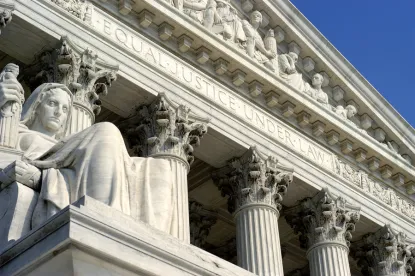The Nine were back in action this morning, as they will be every Monday from here on out (and probably a number or other days besides). There were four new decisions announced today, including what was expected to be one of the blockbusters of the terms, but ended up being more of a punt: In Masterpiece Cakeshop v. Colorado Civil Rights Comm'n (No. 16-111), the Court ruled in favor of the Christian "cake artist" who refused to bake a wedding cake for a gay couple due to his religious opposition to gay marriage. The 7-2 decision was decisive, but also narrow—Justice Kennedy's majority opinion rested on the Court's finding that the Colorado Civil Rights Commission had exhibited religious hostility toward the baker in this particular case. The Court did not reach the broader question whether the First Amendment prohibits state discrimination laws from being enforced against a religious objector in a neutral proceeding. The sole dissenters were Ginsburg and Sotomayor, but there was a slew of concurring opinions showcasing disagreement about some of the more nettlesome questions posed by the case. We'll tell you all about those opinions later in the week.
The Court (sorta) punted again in Hughes v. United States (No. 17-155), which held that a prisoner sentenced under a plea agreement that stipulates to a specific sentencing range can have his sentence reduced if there is a subsequent retroactive amendment to the Guidelines if the outdated Guidelines range was part of the framework the sentencing court relied on in imposing the sentence or accepting the plea agreement. That issue is tricky enough, but many people were hoping Hughes would also lend clarity to a question that has plagued lower courts: What rule of decision to apply where a Supreme Court decision lacks a controlling opinion (as did an earlier case that failed to definitively answer the sentencing question in Hughes). Apparently, it was easier for a majority to answer the sentencing question than the appellate-procedure question, because the Court left the latter question for another day.
The third decision of the day, Koons v. United States (No. 17-5716), was a bit easier. Based on its "earlier" decision in Hughes, the Court held that the petitioners did not qualify for a sentencing reduction because their sentences (which followed plea agreements stipulating to a range) were not "based on" the subsequently lowered Guidelines range, but rather their mandatory minimums and their substantial assistance to the Government.
Turning from crim-pro to bankruptcy, the Court held in Lamar, Archer & Cofrin v. Appling (No. 16-1215), that a statement about a single asset can qualify as a "statement respect the debtor's financial condition" for purposes of the Bankruptcy Code's prohibition of discharging debts for money, property, services, or credit obtained through a materially false "statement . . . respecting the debtor's . . . financial condition."
Finally, with the third (sorta) punt of the day, the Court issued a per curiam decision in Azar v. Garcia (No. 17-654), the case involving an "unaccompanied minor" immigrant's right to an abortion while in the custody of the Office of Refugee Resettlement. As anticipated, the Court granted the Government's petition for certiorari and vacated the D.C. Circuit's decision requiring the Government to facilitate the minor's abortion under the so-called Munsingwear doctrine, because the case had been mooted by the fact that the minor already had the abortion. (Under Munsingwear, when a civil case becomes moot on its way to the Court through the unilateral actions of one of the parties, the general rule is to vacate the decision below.) But the Court did not wade into a more controversial issue in the case. The Government has suggested that the Court consider referring the minor's counsel for professional sanctions based on alleged their alleged misrepresentations to counsel for the Government about when the abortion was scheduled, which, the Government claimed, prevented them from being able to file an emergency stay application before the abortion occurred. The Court stressed the need for counsel to carefully balance their ethical obligations as officers of the court with their obligations of zealous advocacy, but insisted that it "need not delve into the factual disputes raised by the parties in order to answer the Munsingwear question here."






 />i
/>i
